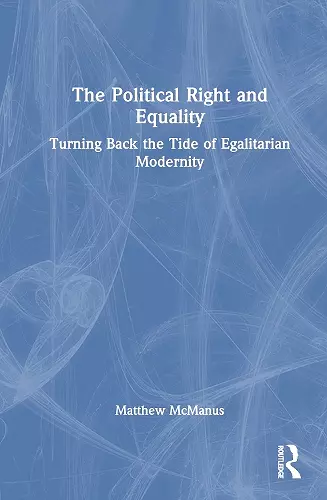The Political Right and Equality
Turning Back the Tide of Egalitarian Modernity
Format:Hardback
Publisher:Taylor & Francis Ltd
Published:21st Jul '23
Currently unavailable, and unfortunately no date known when it will be back
This hardback is available in another edition too:
- Paperback£39.99(9781032310831)

McManus presents an intellectual history of the conservative and reactionary tradition, stretching from Aristotle and Filmer to Alexander Dugin and Patrick Deneen.
Providing a comprehensive critical genealogy of the intellectual political right, McManus traces its core to a nostalgia for the hierarchical cosmos of antiquarian and scholastic thinking. The yearning for a shared vision of the universe where each part of reality has its place maps onto the conservative admiration for orderly political and social stratification. It stamps even the more moderate forms of liberal conservatism which emerged in the aftermath of the revolutionary 18th century, as the political right struggled to accept and later master first the politics of liberal capitalism and later universal suffrage. In its most radical forms this nostalgia for an orderly and hierarchical existence can harden into a resentment at the perceived shallowness of liberal modernity. McManus argues for those who support the project of modernity to commit themselves to better understanding the depth of the political right’s critiques, many of which expose uncomfortable but solvable problems with the quest for equality and freedom.
A critical guide to the history of conservative and reactionary thought for students and scholars of political science and political history.
While there are a lot of competing explanations for the contemporary rise of right-wing forces, Matt McManus’ new book suggests that it is hostility to equality that actually unites the right. Zeroing in on key intellectuals and writers, McManus, in a sharply written text, offers a compelling explanation for the disproportionate intensity of right-wing grievance politics.
An indispensable public resource in recent years, Matthew McManus has been tracing our everyday political controversies back to the intellectual traditions that help make sense of our times. Now he has turned in the most accessible and useful analysis of conservative thought there is. Incisive, learned, and up-to-date, The Political Right and Equality provides desperately needed orientation for anyone who hopes to forge a progressive response.
Samuel Moyn, Yale University
Matt McManus brilliantly surveys two millennia of political philosophy to uncover the oft-misunderstood roots of contemporary conservatism. A must-read for anyone who really wants to grasp the deeper historical and theoretical currents driving today’s authoritarian, post-liberal right.
Greg Sargent, The Washington Post
McManus provides a highly readable, intellectual history of the 'political right' that underscores the present dangers of reactionary politics and offers a timely reminder about what is at stake for those interested in a better world.
Igor Shoikhedbrod, Department of Political Science, St. Francis Xavier University
It is accurate to say that an organizing principle on the Right is a hostility to democracy, but making this claim stick can be a challenge owing to the seeming heterogeneity of the conservative intellectual project: traditionalists, libertarians, post-liberals, neo-reactionaries, and a host of other bedfellows often give the impression that the modern (and postmodern) Right is more dazzling tapestry than dim cloth. In The Political Right and Equality, Matt McManus zooms in on the intellectual and historical roots of the Right’s antipathy to democracy, showing how their defense of hierarchy as a matter of principle explains widespread resentment on the Right of modern society, not because it is intrinsically egalitarian but simply because it could be. McManus marshals readings of key intellectual figures to make a case vital for any reader seeking to sense of what often feels like an illogical series of alliances between conservatives.
Paul Elliott Johnson, Assistant Professor, Department of Communication, University of Pittsburgh
That contradictory posture is more or less what mainstream Anglophone conservatism has amounted to for a very long time. The movement’s protagonists lament the demise of meaning and belonging and “little platoons,” while upholding grossly unjust inequalities in economic power that only accelerate the loss. There has always been an ugly alternative path for the right, of course: one that would simply ratify inequality on the basis of racial and/or I.Q.-based hierarchies, or else seek to reconstitute lost organic social order on the basis of racial solidarity, shifting the blame for antagonisms inherent to modern economic relations to ethnic minorities, most notably the Jews. Much of McManus’s book is devoted to exploring these darker paths.
Sohrab Ahmari, The American Conservative
The first three chapters of McManus’ account – stretching from Aristotle to the early twentieth century – are largely faultless....That McManus feels compelled to nuance his analysis even at this early stage of the book hints at its basic strength: teasing out – in a rather dialectical way – the contradictory tensions that inform the thinkers under discussion (an approach he also extends to literary figures, in superlative sections on T.S. Eliot and Dostoevsky).
Conrad Hamilton, Phd Graduate From the University of Paris VIII
Matthew McManus’s The Political Right and Equality represents one recent attempt to grapple with an intellectual legacy that holds a dominant position in the world of actually existing politics, if not
in academia. The book’s central thesis alone demands attention from progressive intellectuals.
Larry Alan Busk, Radical Philosophy Review, DOI: 10.5840/radphilrev2023262141
ISBN: 9781032310848
Dimensions: unknown
Weight: 453g
268 pages